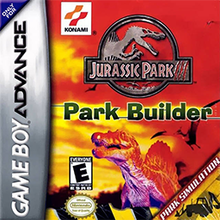Jurassic Park III: Park Builder
This article needs additional citations for verification. (April 2009) |
| Jurassic Park III: Park Builder | |
|---|---|
 North American box art | |
| Developer(s) | Konami |
| Publisher(s) | Konami |
| Series | Jurassic Park |
| Platform(s) | Game Boy Advance |
| Release | |
| Genre(s) | Construction and management simulation |
| Mode(s) | Single-player |
Jurassic Park III: Park Builder is a 2001 construction and management simulation game developed and published by Konami for the Game Boy Advance.
It is the second game in the Jurassic Park III series of titles for the Game Boy Advance after The DNA Factor, and is followed by Island Attack.
Summary
[edit]Jurassic Park III: Park Builder challenges the player to design and run an island-based Jurassic Park theme park, similar to Jurassic Park: Operation Genesis. The player must first send an excavation team to one of eight worldwide locations to search for fossilized mosquitoes that contain dinosaur DNA, which is then used to create dinosaurs.[4]
The player can place structures in the park such as hotels, restaurants and shops. Hurricanes and earthquakes can damage the park's buildings. The player must advertise the park in order to attract more customers. Visitors to the park must view the dinosaurs while riding on tour buses. The player begins with three buses and can purchase more later.[4]
The player is given a maximum of eight holding pens for however many dinosaurs the park may have. There are six different environments on the island, including jungles, a beach, plains, and a desert. Dinosaurs can become ill and require medical attention. To keep them healthy, the dinosaurs are placed in environments that closely resemble their natural habitat.[4]
The game features 140 creatures, including Brachiosaurus, Mosasaurus, Pteranodon, Spinosaurus, Stegosaurus and Tyrannosaurus. The dinosaurs, depending on their size and aggression, are grouped into six categories: three for carnivores and three for herbivores.[4]
Reception
[edit]| Aggregator | Score |
|---|---|
| GameRankings | 68.54%[5] |
| Metacritic | 65/100[6] |
| Publication | Score |
|---|---|
| AllGame | |
| Computer and Video Games | 7/10[8] |
| Game Informer | 7.25/10[9] |
| IGN | 7/10[10] |
| Nintendo Power |
The game was met with average to mixed reception, as GameRankings gave it a score of 68.54%,[5] while Metacritic gave it 65 out of 100.[6]
AllGame criticized the game for its few sound effects and "generic background music", as well as the need to "constantly switch back and forth" between different menu screens, "making it easy to forget what you're doing in relation to what needs to be done."[7]
IGN wrote a positive review but criticized the game for its lack of a tutorial mode: "It's a very complex game with tons of little elements to manage...and it's boggling to see that the developers don't offer even the most basic tutorial for beginner park builders. Right from the get-go, you're thrust into the game without knowing what does what, or how you're supposed to do it."[10]
See also
[edit]References
[edit]- ^ Ahmed, Shahed (September 12, 2001). "Konami ships PS2/GBA games". GameSpot. Archived from the original on March 31, 2002. Retrieved June 16, 2024.
- ^ "Jurassic Park III: Park Builder Release Information for Game Boy Advance - GameFAQs". Archived from the original on 2014-06-07. Retrieved 2014-04-13.
- ^ "Jurassic Park 3: Park Builder". Chipsworld. Archived from the original on July 3, 2002. Retrieved June 16, 2024.
- ^ a b c d "Jurassic Park III: Park Builder". Nintendo Power Advance magazine. 2001. p. 72–82. Retrieved 2015-03-01.
- ^ a b "Jurassic Park III: Park Builder for Game Boy Advance". GameRankings. Retrieved 2014-04-13.
- ^ a b "Jurassic Park III: Park Builder for Game Boy Advance Reviews". Metacritic. Retrieved 2014-04-13.
- ^ a b Beam, Jennifer. "Jurassic Park III: Park Builder - Review". AllGame. Archived from the original on 2014-11-15. Retrieved 2014-11-15.
- ^ CVG Staff (2001-11-10). "GBA Review: Jurassic Park III: Park Builder". Computer and Video Games. Archived from the original on 2007-06-24. Retrieved 2014-04-13.
- ^ "Jurassic Park III: Park Builder". Game Informer. 2001.
- ^ a b Harris, Craig (27 September 2001). "Jurassic Park III: Park Builder". IGN. Retrieved 2014-04-13.
- ^ "Jurassic Park III: Park Builder". Nintendo Power. Vol. 148. September 2001.
External links
[edit]- 2001 video games
- Game Boy Advance games
- Game Boy Advance-only games
- Jurassic Park video games
- Konami games
- Construction and management simulation games
- Video games with oblique graphics
- Video games based on films
- Video games based on adaptations
- Video games set on fictional islands
- Video games developed in Japan
